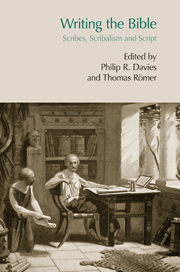Book contents
- Frontmatter
- Contents
- Abbreviations
- 1 Introduction
- I Writing in the ancient world
- II Hebrew Bible and early Judaism
- 4 The dissemination of written texts
- 5 Genesis: a composition for construing a homeland of the imagination for elite scribal circles or for educating the illiterate?
- 6 The “Prophets” as scriptural collection and scriptural prophecy during the Second Temple period
- 7 From prophet to scribe: Jeremiah, Huldah and the invention of the book
- 8 Instituting through writing: the letters of Mordecai in Esther 9:20-28
- 9 The Scribe and his class: Ben Sira on rich and poor
- III Early Judaism and early Christianity
- Index of biblical and other ancient sources
- Author index
4 - The dissemination of written texts
- Frontmatter
- Contents
- Abbreviations
- 1 Introduction
- I Writing in the ancient world
- II Hebrew Bible and early Judaism
- 4 The dissemination of written texts
- 5 Genesis: a composition for construing a homeland of the imagination for elite scribal circles or for educating the illiterate?
- 6 The “Prophets” as scriptural collection and scriptural prophecy during the Second Temple period
- 7 From prophet to scribe: Jeremiah, Huldah and the invention of the book
- 8 Instituting through writing: the letters of Mordecai in Esther 9:20-28
- 9 The Scribe and his class: Ben Sira on rich and poor
- III Early Judaism and early Christianity
- Index of biblical and other ancient sources
- Author index
Summary
The thread of this chapter will be the combination of oral and written communication and transmission in the formation and dissemination of the Hebrew scriptural canon. Let us begin by asking who knew the contents of the canonized literature, when and in what form. In Hecataeus of Abdera's account of Jewish history (end of fourth century BCE; for the text see Stern 1976: I, 20–35), one can see the outline of a Pentateuchal narrative, at least from Exodus to Numbers or Deuteronomy, suggesting that this Greek living in Egypt was familiar, at first or second hand, with the story they contained. However, since he goes on to say that the Jews have never had a king, he and his sources were apparently unaware of the stories of Joshua–Kings or of Chronicles. Perhaps these had simply not been translated into Greek, but if his sources were written, why does he deviate from even the Pentateuchal narrative? A century later, Ben Sira seems to know the content of most of the books, and a scroll of twelve prophets—but probably not Ezra or even parts of the Pentateuch. Another century later the writer of 1 Maccabees is aware of Abraham, Joseph, Phinehas, David, Elijah and the book of Daniel—or at least some of its stories (2:51–60)—while the more or less contemporary writer of Jubilees knows the Pentateuch in detail.
- Type
- Chapter
- Information
- Writing the BibleScribes, Scribalism and Script, pp. 35 - 46Publisher: Acumen PublishingPrint publication year: 2013



